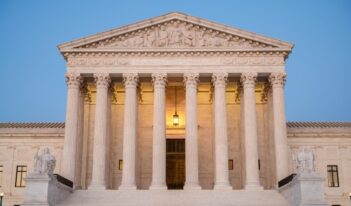
A recent court decision supports using procurement authority to address climate change and other policy issues.
Last month, the U.S. Court of Appeals for the Tenth Circuit upheld President Biden’s executive order mandating higher wages for federal contract workers. The decision affirmed the President’s broad authority to set rules that govern the federal procurement process. The Administration should use this authority to establish new standards for government contracting, including finalizing its proposal to require greenhouse gas emissions inventory and climate risk assessments from firms that contract with the government.
A handful of recent court losses have sparked concerns inside and outside of the Administration about the scope of the government’s authority to impose conditions on federal contractors, who directly employ around 20 percent of the U.S. workforce. In the wake of the COVID-19 pandemic, multiple circuit court panels invalidated a procurement executive order imposing vaccine and testing requirements on contracting workforces. And an effort to raise the minimum wage for federal contractor employees has met with a mixed reception—the U.S. District Court for the Southern District of Texas issued an injunction against it, while other federal courts have upheld the hike.
But the movement to curtail executive authority over federal contractors faltered in April, when the Tenth Circuit upheld the Biden Administration’s contractor minimum wage hike as applied to seasonal recreational workers. In a 2-1 ruling, the appeals court rejected the plaintiffs’ two primary claims. The court found that the Federal Property and Administrative Services Act (FPASA) confers on the President a rather broad delegation of authority to make rules about government procurement that he finds are “necessary” in the interest of “economy” and “efficiency.” It also declined to apply the U.S. Supreme Court’s major questions doctrine, which subjects certain consequential rules to heightened scrutiny in the courts. Noting that FPASA had been used repeatedly by administrations to issue myriad rules, the court found that the order was not a novel or transformative exercise of statutory authority, nor was it outside the bounds of FPASA.
The Tenth Circuit’s decision bodes well for other FPASA initiatives, including a pending rule to require large federal contractors to disclose limited information about their carbon emissions and exposure to climate risk. As the Tenth Circuit panel noted, along the lines of what we have noted ourselves in the past:
“‘economy’ and ‘efficiency’ are not narrow terms. They encompass those factors like price, quality, suitability, and availability of goods or services that are involved in all acquisition decisions. The standard is a lenient one, and courts have respected the President’s judgment as to how a given executive order is likely to advance the statute’s objectives.”
We can draw a straight line from emissions and climate risk transparency to a stable and reliable procurement process better insulated from climate emergencies. Without the information disclosed under the proposed rule, agencies are ill-equipped to assess the riskiness of their acquisitions because they are flying blind with respect to their purchases’ climate-related externalities and risks.
Under the Tenth Circuit’s logic, the major questions doctrine also should not present an issue. If the minimum wage order’s price tag of $1.7 billion per year did not justify major questions scrutiny, it is hard to imagine that the costs of the proposed disclosure rule, estimated at less than $500 million annually, should either. The Administration can, therefore, be even more confident about the legal defensibility of the disclosure regulation.
Perhaps it is time to question what has become conventional wisdom in—admittedly wonky—procurement circles: that the government’s FPASA authority faces pervasive skepticism. Aside from the COVID-19 order, which as we have previously explained did make a novel attempt to impose requirements on contractors’ workers rather than the contractor-employers, FPASA rules actually have fared decently well in court. Knowing this, the Administration should quickly finalize its pending rule on contractor emissions.
And in a potential second term, the Biden Administration should consider pursuing a broader array of procurement priorities. For example, alongside other advocates, we have argued for a procurement rule to prohibit traditional and de facto noncompete clauses. This would be useful in the event that courts curtail the Federal Trade Commission’s recently announced regulation on the subject—and for categories of contractors whose employees fall outside of the Commission’s jurisdiction.
In a dissenting opinion in the Tenth Circuit decision, Judge Allison H. Eid argued that FPASA violates the nondelegation doctrine and is therefore unconstitutional. It is difficult to overstate the extremism of that position. The federal government has issued a long list of FPASA orders since the statute’s enactment in 1949, all of which would come undone should Judge Eid’s interpretation prevail. So let us assume, for the moment, that even strident critics will recognize how bizarre it would be to rule that a statute constantly in force for decades has been unconstitutional all along. We are left, in that case, with Judge Eid’s relatively frank admission, found in a footnote, about the statute’s plain text: “It would be hard to imagine any scenario where an agency rule exceeds the FPASA’s vast grant of power after the President uses ‘economy’ and ‘efficiency’ as the justifications of executive action.”





